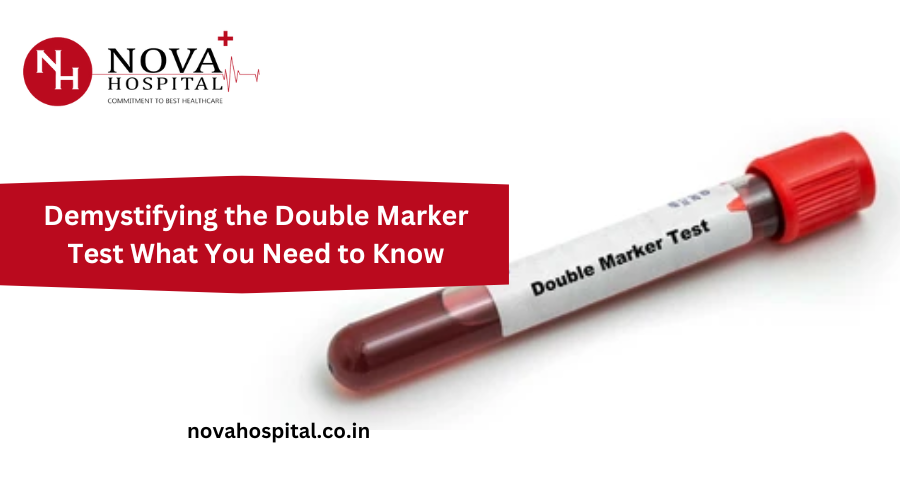Demystifying the Double Marker Test What You Need to Know
Pregnancy is a joyous and exciting time for many women, but it can also be a stressful period as there are many things to consider for a healthy pregnancy. One important aspect of prenatal care is prenatal screening tests. The double marker test is one such screening test that has become increasingly popular among expecting mothers.
The double marker test is a blood test that measures two specific hormones – hCG and PAPP-A – to assess the risk of certain genetic disorders and pregnancy complications. In this blog post, we will demystify the double marker test, explaining what it is, why it is important, who should get it, and what to expect during the test.
Whether you are a first-time mother or a seasoned veteran, understanding the double marker test can help you make informed decisions about your pregnancy and ensure the best possible outcome for you and your baby.
What is the Double Marker Test?
The double marker test, also known as the dual marker test, is a prenatal screening test that helps to identify the risk of certain genetic disorders and pregnancy complications. The test measures the levels of two specific hormones – human chorionic gonadotropin (hCG) and pregnancy-associated plasma protein-A (PAPP-A) – in the mother’s blood. These hormones are produced by the placenta during pregnancy and can provide important information about the health of the baby.
The test is typically conducted between the 10th and 14th week of pregnancy and involves a simple blood draw from the mother’s arm. The blood sample is then sent to a laboratory for analysis, and the results are usually available within a week.
The double marker test report will include the levels of hCG and PAPP-A, as well as the risk of certain chromosomal abnormalities, such as Down syndrome.
Why is the Double Marker Test Important?
- hCG and PAPP-A levels can provide important information about the health of the baby and the risk of certain genetic disorders and pregnancy complications.
- Early detection of potential complications can allow for prompt medical intervention and better management of the pregnancy.
- It can detect conditions such as Down syndrome, trisomy 18, and open neural tube defects.
- The test can also help to identify pregnancies at risk for preterm delivery, preeclampsia, and other complications.
- The information provided by the double marker test can help expectant mothers and their healthcare providers make informed decisions about further testing, treatment, and prenatal care.
Who Should Get the Double Marker Test?
- The double marker test is recommended for all pregnant women, but it is especially important for women who are at high risk for pregnancy complications.
- Women who are over the age of 35, have a history of chromosomal abnormalities, or have a family history of genetic disorders may be considered at higher risk and may be advised to undergo the test.
- Women who have had previous pregnancy complications or medical conditions such as diabetes, hypertension, or autoimmune disorders may also be at higher risk and may benefit from the test.
How to get ready for the Double Marker Test
Before getting this test, it is important to understand what to expect during the test, any dietary or lifestyle changes that should be made, and the potential risks and complications associated with the test.
It is a simple blood test that involves a blood draw from the mother’s arm. The test poses minimal risks and discomfort to the mother and the baby.
There are no specific dietary or lifestyle changes that need to be made before the test. However, it is important to inform the healthcare provider if the mother is taking any medications or supplements that may affect the test results. Certain medications, such as aspirin and steroids, can affect the levels of hCG and PAPP-A and may need to be temporarily discontinued before the test.
While the double marker test is generally considered safe, there is a small risk of complications such as bleeding, infection, or damage to the veins.
It is important to discuss any concerns or questions about the test with a healthcare provider before undergoing the test.
Conclusion
The double marker test is an important tool for identifying potential genetic disorders and pregnancy complications early on in pregnancy. By understanding the significance of hCG and PAPP-A levels, expectant mothers can take proactive steps to ensure the best possible outcome for their pregnancy.
At Nova Hospital, we understand the importance of maternal and fetal health and offer comprehensive testing and care throughout pregnancy.
Our team of experienced gynecologists and obstetricians is equipped to provide high-quality care and support, from routine prenatal care to complex pregnancy management.
As the Best gynecologist hospital in Lucknow, we are committed to providing compassionate and personalized care to our patients. Whether you are considering the double marker test or require specialized pregnancy care, our team is dedicated to helping you achieve a healthy pregnancy and delivery.
If you have concerns about the double marker test or any aspect of pregnancy care, we encourage you to schedule a consultation with one of our experienced healthcare providers. We look forward to partnering with you on your journey to motherhood.

